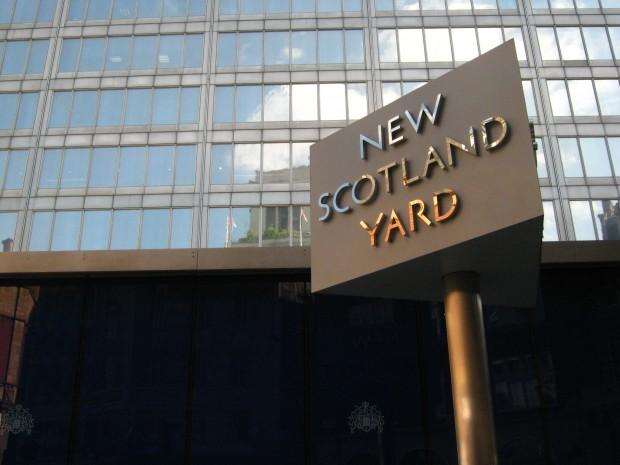Death Devices From London’s Most Famous Crimes May Soon be on Public Display
New Scotland Yard, which houses a crime museum in the basement. Some Londoners are demanding the museum be opened to the public. (Photo: Russell Newlove)
I’m outside New Scotland Yard, the headquarters of the London Metropolitan Police. By 2015, though, the Met will have moved into new premises on the bank of the River Thames. It will be a huge and costly undertaking, and as anyone who has moved house knows, there’s a lot of packing to do. Andrew Boff is a conservative leader in the London Assembly.
“It turns one’s mind to what is actually at New Scotland Yard,” says Boff. “And one of the things that we do know is that it’s got the Crime Museum.”
The Crime Museum is made up of artifacts from some of London’s most famous crimes. It’s got the lot: murder weapons, a letter purportedly from Jack the Ripper, hangman’s nooses, death-masks of executed criminals. I can’t say for certain, though, because I’m not allowed in, and neither are you.
“The Museum is currently open to selected guests rather than the general public. I think that’s a bit unfair bearing in mind Londoners are paying for it and we actually do need to pay for its accommodation,” says Boff. “So we were thinking how can we be a bit more transparent about what is a [community] asset and how we can go about paying for it? And so we came up with the idea of there being an exhibition of the crime museum. And I think it would be something that would be of interest not just to Londoners, but also round the world.
Founded in 1875, and under lock and key ever since, the Crime Museum was conceived as a teaching aid for training police officers in methods of crime fighting. Over the years, its relevance has waned, but this ‘history of CSI’ exhibition could still be a big draw, says Boff. He predicts it could pull in about $7.75 million in just three months.
But Mark Taylor says opening a museum a lot more complicated than it seems. Taylor is the head of the Museums Association in the United Kingdom. He says making the crime museum available to the public requires more than just opening the doors.
“Well, first of all you have to deal with the building. Then you have to deal with the collection, then the marketing, and the staff. It’s a complicated business and it doesn’t come cheap.”
But Taylor does agree that people would pay to see the museum’s collection. Gory aspects of history have always proved popular with tourists. Outside the Tower of London, hundreds meet nightly for a Jack the Ripper tour, a guided walk around the East End with plenty of bloody details, and a few laughs.
So there’s clearly money to be made. But Taylor says this explicit pursuit of cash raises a few issues.
“Some of these objects, they have may be about previous murders, some of the names I’ve seen bandied about are relatively recent mass murderers. So I think a degree of sensitivity will be required here to make sure they are properly researched, properly displayed, and if they may cause offense, they’re treated with due respect.”
The police declined to be interviewed for this story. But they did issue a statement insisting there are no plans to open the museum just yet. But the statement also read that as they relocate, “careful consideration will be given to the future of the Crime Museum.”
Andrew Boff doesn’t buy it.
“The metropolitan police have thought it important enough to keep this exhibition,” he says. “I think it’s about the time the public got an eye on it as well. It’s all very well keeping it just for them, but I think the public would like a greater understanding of the history of the most successful police service in the world.”
So, maybe hold off on placing the museum in next year’s tour guide. But if you really need to go, there are plenty of ways to get inside New Scotland Yard.
But I wouldn’t recommend any of them. You might end up on display.
